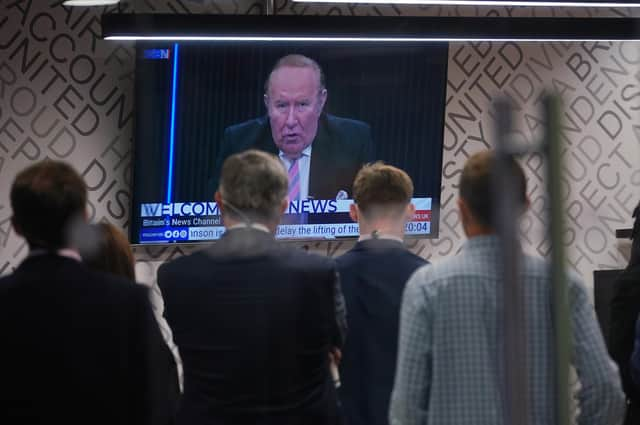A bruising launch but what future for GB News? - Paul Hughes


It launched last Sunday evening into a blistering inferno of social media “hot takes” that have predictably deemed it to be either the coming of the media Messiah or Mephistopheles.
In its first week the channel has been plagued by technical difficulties and been the subject of hundreds of editorial complaints to the regulator, Ofcom. It has lost high profile advertisers such as Vodafone and Ikea, and found itself targeted by fake viewer contributions from the likes of “Mike Hunt” and “Mike Oxlong”.
Advertisement
Hide AdAdvertisement
Hide AdI should declare an interest here. I have been heavily involved in the launch of a half dozen TV stations across the UK, most recently STV2 and its local stations. I’ve also worked for the big networks in London and know the pressures of that marketplace. Therefore, I’ve watched this unfold like a nostalgic parent, wistfully observing how others cope with the trauma of creating and nurturing a newborn entity into a cruel world that instantly compares all small TV start-ups to network giants.


I have a great deal of professional empathy for the GB News team. Launching live TV stations is technically and editorially extremely difficult and the team behind the scenes at GB News should be warmly applauded for getting this far. However, that doesn’t absolve all their formative sins.
The launch was unquestionably of poor technical quality as I’m sure the GB News team will be painfully aware, no matter how they portray it in public. Many of the problems are things you would expect TV people to know.
For example, big networks like BBC One HD transmit at higher bitrates with lots of picture data, roughly 4Mb/s – 10Mb/s, while small channels are heavily compressed around 1Mb/s to 2Mb/s meaning less data and detail. Heavily compressed video doesn’t like dark studio sets in subtle shades of grey which probably explains the indistinct and muddy look of the launch.
Similarly, the tinny, hollow sound of the presenters indicates that the studios may be soundproofed but not acoustically treated against the reflective, shiny surfaces of smallish studio spaces. The standard solution would be to strategically place acoustic panels or baffles to dampen the reflections.
Whatever the internal reasons, it indicates a lack of understanding that when you move from network broadcasting palaces to more modest accommodation, you are completely reliant on the expertise of a very small group with no slack. Highly paid presenters, no matter how good, will not help. They are the parmesan and not the pasta and sauce.
Much has been made of the inspirational roots of GB News in American stations like Fox News. However, US TV studios are temples of beauty where exceptional lighting, glorious sets, glamorous presenters and sensational make-up are highly prized. Much of a channel’s authority derives from this.
The same applies to editorial. US news networks, like McDonalds, produce a consistently perfect blend of sweet and savoury that guarantees you know what you’re getting every time you return. This masterfully crafted confection cannot be replicated by simply putting less light and a microphone on a lightly powdered Andrew Neil while he reads out his Op Ed - even if that is one of the channel’s highlights.
Advertisement
Hide AdAdvertisement
Hide AdSmall channels also require a defined, editorial purpose to build an audience. Ideally, something they can’t get elsewhere. GB News is relying heavily on an older (the average age of a UK TV viewer is 60+) anti-woke audience that rejects the current UK broadcast offering and congregates around Twitter and the Daily Mail comments section.
However, there is a chasm between highly regulated and painstakingly edited TV News and the unregulated, super strong, reactionary slew of opinion on social media that the anti-woke brigade have become accustomed to and can arguably access with greater ease online.
GB News may wish to emulate American TV for its social media malcontents but this isn’t America and it isn’t social media. Once the dust settles and an outraged Dan Wooton is running out of woke-smashing fodder, when the regulator has clipped a few wings, after the initial audiences lull to a subset of grumpy older folk – doesn’t it all just become a diluted version of Twitter hot-takes mashed in with some genuine news, for an ageing niche market?
It’s not all doom and gloom. There are some real jewels in the team including Alastair Stewart who is one of most politically astute and engaged news presenters I’ve worked with. The channel also has a series of high profile, wealthy investors in the boardroom who will crave success. That buys a little time for the team on the shop floor who will develop an esprit de corps from a deeply bruising launch and that mix could just be enough to take the station through the inevitable ratings “trough of doom” all new channels face.
Finally, I suspect the leadership of GB News may just be right that there are many under-serviced viewers out there who are right-leaning and enjoy their news served up with a touch of outrage by some impeccably tailored, old-school TV hacks. The question is how many and is this the product they want?
Whatever the outcome, like many small channels, GB News will undoubtedly create a pause for thought amongst its longer established and better funded competitive set and while it may be distasteful to many, that kind of disruption can only be a good thing for the industry long term.
Paul Hughes is the Managing Director of Solid Media, a media production and consultancy company. He is the former Head of Programmes at STV and former Managing Editor of ITV Westminster